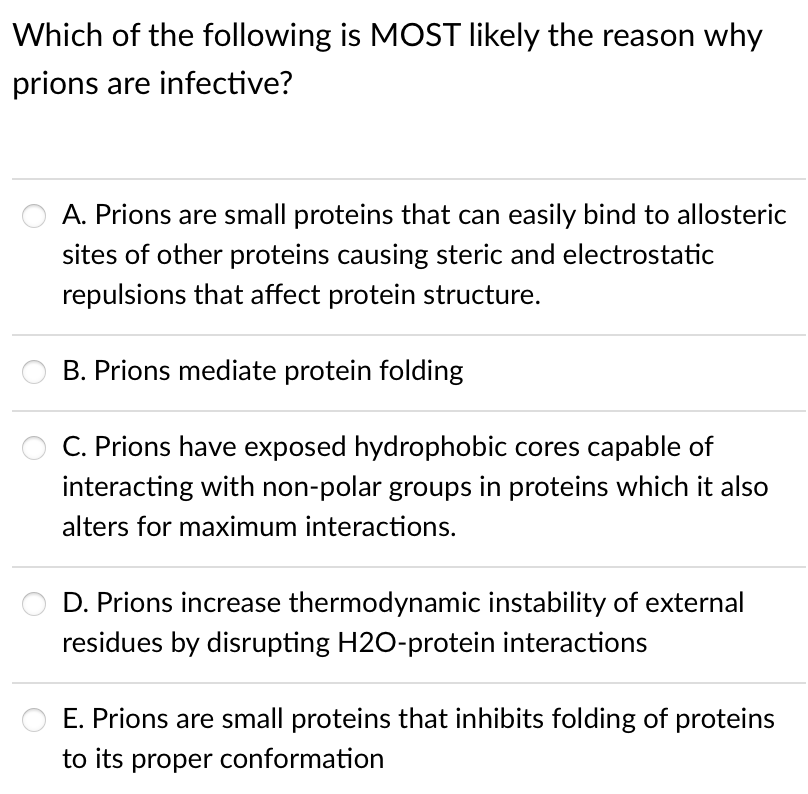Which of the following is MOST likely the reason why prions are infective? A. Prions are small proteins that can easily bind to allosteric sites of other proteins causing steric and electrostatic repulsions that affect protein structure. B. Prions mediate protein folding C. Prions have exposed hydrophobic cores capable of interacting with non-polar groups in proteins which it also alters for maximum interactions. D. Prions increase thermodynamic instability of external residues by disrupting H2O-protein interactions E. Prions are small proteins that inhibits folding of proteins to its proper conformation
Which of the following is MOST likely the reason why prions are infective? A. Prions are small proteins that can easily bind to allosteric sites of other proteins causing steric and electrostatic repulsions that affect protein structure. B. Prions mediate protein folding C. Prions have exposed hydrophobic cores capable of interacting with non-polar groups in proteins which it also alters for maximum interactions. D. Prions increase thermodynamic instability of external residues by disrupting H2O-protein interactions E. Prions are small proteins that inhibits folding of proteins to its proper conformation
Biochemistry
9th Edition
ISBN:9781319114671
Author:Lubert Stryer, Jeremy M. Berg, John L. Tymoczko, Gregory J. Gatto Jr.
Publisher:Lubert Stryer, Jeremy M. Berg, John L. Tymoczko, Gregory J. Gatto Jr.
Chapter1: Biochemistry: An Evolving Science
Section: Chapter Questions
Problem 1P
Related questions
Question

Transcribed Image Text:Which of the following is MOST likely the reason why
prions are infective?
A. Prions are small proteins that can easily bind to allosteric
sites of other proteins causing steric and electrostatic
repulsions that affect protein structure.
B. Prions mediate protein folding
C. Prions have exposed hydrophobic cores capable of
interacting with non-polar groups in proteins which it also
alters for maximum interactions.
D. Prions increase thermodynamic instability of external
residues by disrupting H2O-protein interactions
E. Prions are small proteins that inhibits folding of proteins
to its proper conformation
Expert Solution
This question has been solved!
Explore an expertly crafted, step-by-step solution for a thorough understanding of key concepts.
Step by step
Solved in 2 steps

Recommended textbooks for you

Biochemistry
Biochemistry
ISBN:
9781319114671
Author:
Lubert Stryer, Jeremy M. Berg, John L. Tymoczko, Gregory J. Gatto Jr.
Publisher:
W. H. Freeman

Lehninger Principles of Biochemistry
Biochemistry
ISBN:
9781464126116
Author:
David L. Nelson, Michael M. Cox
Publisher:
W. H. Freeman

Fundamentals of Biochemistry: Life at the Molecul…
Biochemistry
ISBN:
9781118918401
Author:
Donald Voet, Judith G. Voet, Charlotte W. Pratt
Publisher:
WILEY

Biochemistry
Biochemistry
ISBN:
9781319114671
Author:
Lubert Stryer, Jeremy M. Berg, John L. Tymoczko, Gregory J. Gatto Jr.
Publisher:
W. H. Freeman

Lehninger Principles of Biochemistry
Biochemistry
ISBN:
9781464126116
Author:
David L. Nelson, Michael M. Cox
Publisher:
W. H. Freeman

Fundamentals of Biochemistry: Life at the Molecul…
Biochemistry
ISBN:
9781118918401
Author:
Donald Voet, Judith G. Voet, Charlotte W. Pratt
Publisher:
WILEY

Biochemistry
Biochemistry
ISBN:
9781305961135
Author:
Mary K. Campbell, Shawn O. Farrell, Owen M. McDougal
Publisher:
Cengage Learning

Biochemistry
Biochemistry
ISBN:
9781305577206
Author:
Reginald H. Garrett, Charles M. Grisham
Publisher:
Cengage Learning

Fundamentals of General, Organic, and Biological …
Biochemistry
ISBN:
9780134015187
Author:
John E. McMurry, David S. Ballantine, Carl A. Hoeger, Virginia E. Peterson
Publisher:
PEARSON